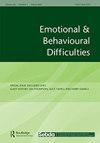注意缺陷/多动障碍(ADHD)的本质主义信念:对职前教师的实证研究
IF 1.5
Q3 PSYCHOLOGY, EDUCATIONAL
引用次数: 1
摘要
注意缺陷/多动障碍(ADHD)是一种常见于情绪和行为困难儿童的诊断。然而,目前尚不清楚教师对这种障碍持有哪些具体信念,以及这些信念如何塑造他们的期望。关于注意力缺陷多动障碍的本质主义信念(即认为患有注意力缺陷多动障碍的个体与其他人有本质上的不同)在科学和公共话语中普遍存在,但它们可能会引发不吉利的期望,从而引发消极的自我实现预言。在一项在线研究中,我们随机将职前教师(N = 213)分配到诱导ADHD本质主义信念的组和对照组。实验操作诱发了本质主义信念,尽管只是在一个小群体中。在先前有更多ADHD经历的参与者中,本质主义信念可能会被诱导,并与研究中的一些悲观预期有关。我们的初步研究结果看起来很有希望,应该进一步研究以改善教师培训和更好地支持患有多动症的儿童。本文章由计算机程序翻译,如有差异,请以英文原文为准。
Essentialist beliefs about attention-deficit/hyperactivity disorder (ADHD): an empirical study with preservice teachers
ABSTRACT Attention-deficit/hyperactivity disorder (ADHD) is a frequent diagnosis among children with emotional and behavioural difficulties. However, it is unclear which specific beliefs teachers hold about the disorder and how these shape their expectations. Essentialist beliefs about ADHD (the assumption that individuals with ADHD are fundamentally different from others) are prevalent in scientific and public discourse, but they may raise inauspicious expectations that could trigger negative self-fulfilling prophecies. In an online study, we randomly assigned preservice teachers (N = 213) to a group in which essentialist beliefs about ADHD were induced vs. a control group. The experimental manipulation induced essentialist beliefs, though only in a subgroup. In participants who had more previous experience with ADHD, essentialist beliefs could be induced and were associated with some of the pessimistic expectations studied. Our preliminary findings appear promising and should be further investigated to improve teacher training and to better support children with ADHD.
求助全文
通过发布文献求助,成功后即可免费获取论文全文。
去求助
来源期刊

EMOTIONAL AND BEHAVIOURAL DIFFICULTIES
PSYCHOLOGY, EDUCATIONAL-
CiteScore
1.80
自引率
10.00%
发文量
10
期刊介绍:
The central intention of Emotional & Behavioural Difficulties (EBDs) is to contribute to readers" understanding of social, emotional and behavioural difficulties, and also their knowledge of appropriate ways of preventing and responding to EBDs, in terms of intervention and policy. The journal aims to cater for a wide audience, in response to the diverse nature of the professionals who work with and for children with EBDs.
 求助内容:
求助内容: 应助结果提醒方式:
应助结果提醒方式:


